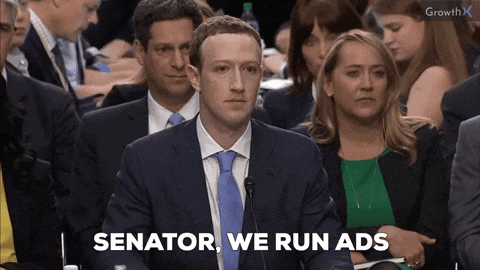- The Startup Breakdown
- Posts
- Social Media is About to Change Forever
Social Media is About to Change Forever
What Europe's Digital Services Act Means for Startups

This is The Startup Breakdown, the newsletter where we learn, laugh, and love startups. By joining this growing community of hundreds of future startup aficionados (think i spelled that right?), you're getting a beachside view of the ocean that is the startup and VC scene. This ain’t your grandpa’s newsletter, so prepare yourself for an inbox full of 4/20 jokes and Succession references.
This is a free preview of The Startup Breakdown: After Dark. If you enjoy this edition and are craving even more startup goodness, in-depth news analysis, and maybe some extra memes? Click below to upgrade to our premium subscription and become the startup guru you were born to be.

Happy Thursday, folks.
That’s right. I’m here on a ~Thursday~
I mentioned in Monday’s edition that I am launching the brand new premium tier of my newsletter, The Startup Breakdown: After Dark.
In this premium edition, I stick to the macro news, breaking down the latest regulations and trends and exactly what they mean for the startup ecosystem.
To help you decide whether you find this content valuable, I’m bringing you this first edition for free.
Sit back and enjoy, and if you like it, maybe consider upgrading? :)

Breaking Down the Digital Services Act
If you enjoy seeing conspiracy theories trending in your local Facebook group, wondering what dark paths you took in life to bring you to the videos on your TikTok fyp, or getting hyper-specific, borderline creepy ads that make you question whether the FBI really is watching you through your camera 24/7 (they’re not. get over yourself), I have some bad news for you.
As of nearly 2 weeks ago, these activities are now banned or highly restricted for major internet platforms in the European Union where the European Commission passed the Digital Services Act. Though passed last year, it went into effect on August 24th.
Without getting too hyperbolic, this is huge. Massive. I’m talking Popeye’s chicken sandwich ginormous.
It could quite literally shape the future of consumer internet, impacting the way we interact with the digital world, and more importantly for you fine folks taking the time to read a newsletter about startups (like... get a life), it will have profound impacts on the world of startups.
So, what exactly is the DSA and why should you care?
The DSA is aimed at increasing transparency and consumer safety on major tech platforms. The law currently targets companies with more than 45 million users in the EU (suddenly a lot of companies with 44.99999 million….) and could result in fines up to 6% of global revenue for non-compliance, or, for repeat offenders who just love to stick it to the man, outright ban from the European single market. The rule expands to all companies, regardless of size, next year.

Gif by comedybar on Giphy
The law specifically covers a few major internet topics:
Transparency & Targeted Ads: Tech giants must be more transparent about their ad targeting and content moderation practices
Misinformation: Platforms required to evaluate the risks of misinformation and curb its spread through algorithmic changes. Regular performance audits are also mandated.
Consumer Choice: Users will have the option to view their feeds in an algorithm-free manner, offering them more control over their experience and the choice to avoid addiction-fueling models. #MadeInstagramInstagramAgain
Protection for Minors: Underage users will not be exposed to personalized ads.
Content Moderation: More tools will be provided for flagging online content as illegal or fraudulent.
Again, these rules are massive, and they are already impacting some of the biggest companies in the world:
Meta (which was already fined last year by Germany for transferring EU data to the US) has announced plans to offer a paid, ad-free subscription to users in an attempt to mitigate the revenue hit that this will have on its ad money. Instagram is also already revealing information on its ranking algorithm and allowing settings that restrict its AI model training.
Twitter, which already offers premium subscribers half as many ads, has been notoriously bad about its failure to moderate its content, and studies showed it has had an outsized impact in the spread of Russian misinformation.
Google is expected to announce changes in ad-targeting practices, and it will soon be publishing information on its current strategies.
Other, non-social companies like Amazon and Zalando are contesting their inclusion in the regulation, a clear sign that these new rules are more impactful than just being a minor inconvenience.

Gif by GrowthX_Club on Giphy
In addition, five of the bigger companies that will fall under the umbrella of this new rule opted in to the EU’s optional stress tests to see whether they were in compliance with the new rules. They weren’t.
All five of the companies (Meta, TikTok, other socials) failed to stop the researchers’ ad submissions which promoted illegal activities like violence against minorities and members of the LGBTQ community, and even assassination attempts on politicians.
In other words, these companies will have to substantially and rapidly alter their current practices to comply, an initiative which will truly occupy space numero uno in their minds as they risk billions of dollars in fines and potentially even loss of access to one of the biggest, wealthiest user bases in the world.
I’m a Startup… So What?
Even outside of the EU, there is reason to pay attention if you’re a tech and startup enthusiast.
For starters, it’s likely that many of the algorithms and ad practices deployed in Europe are the same as those used elsewhere. The data and insights drawn from the European information will be useful to consumers, legal professionals, and regulators around the world as they grapple with reigning in big tech on their own soil.
The precedent set in imposing harsh restrictions could also serve as a model for stricter regulations in other regions, including the U.S, as legislators are able to point to the actions of Europe’s Parliament as a model for cracking down on the companies (and their founders) who have become larger than life.

Gif by snl on Giphy
For startups and founders specifically, the ad model just became waaaaay tougher.
The ol’ saying that “if you aren’t paying, then you’re the product” is true so long as your activity contributes to building a hyper-personalized profile of who you are as a person, data which can be sold to companies looking to burn through their gobs of marketing money on specific demographics that they believe could be buyers of their products.
Having a less tailored user profile could contribute to a decrease in ad deal size as marketers have to take into account the error involved in their calculations on the ROI they expect to receive. If you were planning on monetizing through ads, particularly if your users might skew <18, you might wanna hit the whiteboard for other ideas on making money.
These new rules will also make it much harder for new social media sites to gain ground on the basis of the entertainment value of their algorithms. Few thought that Instagram, Snapchat, and Twitter could ever be toppled just 6-7 short years ago with the network effects and reputation built up over time. Then entered a small Chinese video-first platform, and suddenly everyone was dancing in public and arguing over who had “they hype.”
TikTok’s rise to prominence was driven by its crazy impressive algo. Suddenly, a user with no followers could blow up over night as the algorithm managed to provide every video with the same opportunity to have an audience, ensuring no high-quality content sank to the bottom.
Such success stories will no longer be possible. While users will have to specifically opt out to move away from algo-enhanced feeds, when given the option, some users will certainly take the time, and particularly given the subtle shift towards ever-more ad-intensive and promoted posts, users are becoming fed up with the commercialization of their social feeds.
There will also be higher compliance costs across the board as companies will now require more legal advisory, more time spent in diligence with potential investors, and heavier investment in operational costs like content moderation and user protections.
Perhaps the most important of these provisions in the DSA is that surrounding content moderation policies.
While I’m not getting into the “the left thinks we should only post coming out posts and have to make sure we don’t hurt anyone’s feelings” and “the right thinks we should organize capitol stormings and race-fueled government overhauling” debates, what I can say is that misinformation has become a constant plague in society, demonstrated in the political sentiment echoed during the 2016 US Presidential Election and echoed in political and international discourse around the world since.
These issues have become more pronounced with the rise of AI, a true Pandora’s Box for the info enthusiasts among us (see: kids learning to build video games in a day using ChatGPT without ever having coded; also the picture of the dripped out Pope or the fake Pentagon bombing that tanked the stock market for a couple of minutes).

This one is going to be tough for companies to handle, and if their failed attempts in the past are any indication, I’m not so positive that they will be able to. While there are certainly incentives punishing failure to comply, I’m not 100% convinced that they have the technical know-how to handle this, particularly as big, corporate companies like these tech giants.
Instead, I could see a unicorn born out of the need for Content Moderation as a Service, helping bigger companies to implement checks that don’t dry up all of their resources and help them to comply. If that sounds like something you want to work on, hmu.
Taken together, the Digital Services Act truly is a game changer for big tech already, though the true effects might take a bit more time to surface.
Smaller companies and startups will not escape without feeling the effects of these regulatory changes, either. They will be met with new regulatory realities which will practically destroy (or at least severely cap out) an entire business model, and there will be significant costs imposed across the board.
Perhaps the most impactful changes could be seen in the realm of content moderation. Though ideological differences might prevent people from agreeing what should be censored/not, though, this law has at least set some clear guidelines on how these metrics can be measured and opened up the information for making informed analyses of the effects of such policies.
If you enjoyed this edition and are craving even more startup goodness, in-depth news analysis, and maybe some extra memes? Click below to upgrade to our premium subscription and become the startup guru you were born to be.

New SEC Compliance Rules Are a Pain, but Things Could Have Hurt Worse
I’m gonna let you in on a lil secret.
Well, more like private fund managers are going to let you in on a lil secret.
Well, more like private fund managers are going to let their LPs in on a lil secret.
At the end of last month, the SEC approved new rules which significantly increase the obligations of fund managers to their investors, including regular audits, no preferential treatment for certain outside investors, and quarterly updates. How some of these were never the norm, I will never know.
However, this final draft was still a significantly moderated version of the original, as evidenced by some of the changes which did NOT get lumped in:
The SEC had originally argued for no grandfather clauses for existing side letters
Side letters can still technically exist so long as they are disclosed, and the liquidation and information rights do not have a materially negative impact on other investors
Some other actions were originally expressly prohibited but are now allowed with disclosure and sometimes permission
The original rule has been very harsh on fund managers for negligence, preventing them from taking any steps to limit their personal liability
Frankly, I still wish some of these had remained. However, there were legitimate concerns over the impact that these crackdowns could have had on the startup ecosystem, both in limiting the pool of funds being deployed and propping up the space and in allowing emerging managers the ability to attract big name clients and make a name for themselves outside of the established investment bodies already operating in the space.
Exit Opportunity Fog Could Soon Clear One Way or the Other

Arm’s plans to debut on the public markets have been well-known for weeks now, and we’re finally getting some of the juicy details on the specifics of the exit.
The company is hoping to price its offering at $52 billion, which would easily make it the biggest of the year in the US. While you might look at that big number and say “that doesn’t sound like a startup, Trey”, the result of the transaction will have some important waterfall effects on the industry.
How the market receives the sale will give investors a good gauge on the state of exit ops. If the IPO goes as planned, investors will see the positive reception as a sign of thawing sentiment, making LPs far more willing to part with their cash as there is a clear opportunity to see it as liquid in a few years’ time.
If it goes poorly, further fueling the narrative that exit ops are still down bad, well, good luck, Charlie.
Grit: Putting Code Dependency Updates on Autopilot
Miss Monday’s startup breakdown?
I talked about Grit, a game-changing developer tool that automates the tedious process of software maintenance. Using smart technology like GritQL and AI, it takes care of updating and migrating code, allowing developers to focus on innovation. Despite being in beta, it supports multiple programming languages and has already attracted significant investment. It's poised to disrupt a market expected to reach $10.8 billion by 2028, offering a unique solution in a space dominated by tech giants.
Check it out to learn more.

Being able adapt to our inherently flexible, digital-friendly modern working environment is crucial to taking ownership and enjoying all of the benefits that it has to offer. Looking for practical tips to Jailbreak your own professional life and unlock your freedom? Check out The Jailbreak.
|

Cheers to another day,
Trey





Reply